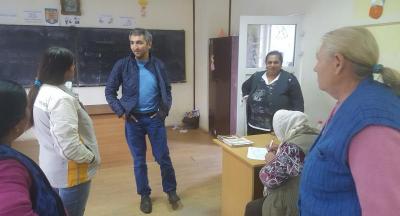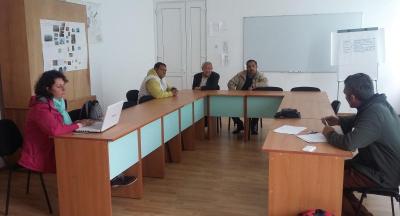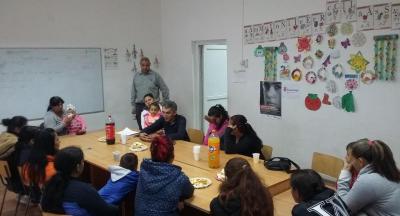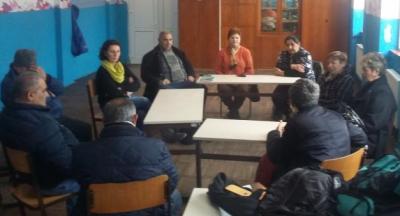Resita
*Disclaimer: The information and views set out in this page do not necessarily reflect the official opinion of the Council of Europe and/or the European Commission. Neither the Council of Europe, the European Commission nor any person acting on their behalf may be held responsible for the use which may be made of the information contained therein.
Last update: 12/01/2017
Resita Municipality, county seat of Caras-Severin County, lies in the south-western part of Romania. Resita is not only Romania’s oldest iron-and-steel industrial center but also one of the most imposing industrial citadels of south-eastern Europe.
Being one of the mono industrial cities of Romania which after 1989 had a very strong economical fell down, Resita managed to decrease the number of population with almost 25.000 inhabitants. In the city are now living 73.282 people, from which officially approx. 1.000 Roma, but in reality are much more (around 3.500).
There are 8 Roma communities in the city: Mociur, Calnic, Terova, La moara, Triaj, Dealu Mare, Muncitoresc and Stavila.
The Roma community from Mociur consist in 96 apartments (where are living 386 people) located in 2 buildings which are in a very bad shape. The level of education here is very low. The kids are studying in a segregated school located near the two blocs. There are no roads and the unemployment rate is very high.
A big part of the people has renting contracts for the flats with the municipality (which owns the two blocks). Most of them are Hungarian Roma and speak Romani. They were working in a state owned company until the year of 2000 where it closed and they remained unemployed. The community has a school mediator.
The Roma community from Calnic is located at the periphery of Calnic neighbourhood, an area which officially it’s just a field. More than 150 people live here; none of the houses have documents, the community has one leader which represents them. The Roma in Calnic are local Roma, which grow horses and live from begging and collecting plastic. The kids are learning in a segregated school. There are no roads, and water supply in the community. The school has school mediator.
The Roma community from Terova is a small community from the village Terova, near Resita, with around 80 Roma people. They are traditional Roma, a big part of them living abroad. The most important problems are related to the ownership papers of the houses, with the water supply and the roads.
La Moara community has around 70 people located in an old building in Resita, under the municipality’s property. They have contracts on the flats. The employment rate is very low. The most important problems are the access to water and the children’s participation in education.
Triaj community is a small one, having around 15 houses which are spread on a street with very big problems regarding access to services. The most important problem here are the roads and employment.
Dealu Mare community is located in the back of a factory and numbers around 300 people. The kids are learning all in a school were the majority of the pupils are Roma. They have a school mediator and the biggest problems are the roads and access to work.
Muncitoresc numbers the biggest Roma community from Resita. They are spread on several streets and part of them are traditional Roma. The kids are leaning in School no.1, they have a school mediator and they can study Romani language. The biggest problems are the housing and the employment. There are around 15 families living in very bad housing condition.
Stavila is a small Roma community were live around 50 people, in very poor conditions. The most important problems are housing conditions, roads and water supply.
The ROMACT Process
ROMACT process started on March 2016. The local action plan was adopted by the Local Council in May 2017.
As of July 2022, ROMACT process is reinforced in Resita and a new agreement was signed by the Mayor. A new Local Action Plan was adopted in October 2022.
The Community Action Group (CAG) identified some of the short/medium/long-term needs and measures:
| Priorities | Objective 1 | Objective 2 | Objective 3 |
|---|---|---|---|
| Education | Realize programs and projects to reduce school dropout and absenteeism | Implement School after School and Second Chance Programs | Employ a school mediator |
| Health | Organize campaigns related to vaccination, pregnancy, contagious diseases | Employ a health mediator | |
| Infrastructure | Solve ownership rights of lands and houses held by Roma inhabitants | Rehabilitate the houses | Rehabilitate roads and connect houses to public utilities |
| Other | Solve lack of ID papers and civil status documents | Offer professional trainings/qualifications | Create new jobs |
The Municipality benefited of ROMACT expertise for the following projects :
The expertise provided by ROMACT for municipalities involves training and guidance on preparing project proposals and implementing inclusive policies aimed at improving the living conditions and social integration of vulnerable populations, including the Roma.
* Network of cities which use CLLD principles and cultural activities to promote Roma inclusion in Europe - Funded by the Europe citizen program, measure 2.2 Thematic Network of towns.
Budget: 150 000€
Status: approved
* Supporting community development, urban regeneration and social inclusion in Resita - Funded by the Financing authority: European Social Fund, Human Capital Operational Program POCU - Priority Axis 5.1.
Budget: 48 544€
Status: approved
* Better care for people with a disability as users of social services - Funded by the Interreg-IPA Cross-border Cooperation Programme Romania- Serbia.
Budget : 863 718€
Status : under evaluation
Trainings provided by ROMACT experts :
Community Action Groups:
* Training on community development.
Local Authorities :
* Training - Elaboration of the JAP ;
* Training - Applying for European Structural Funds ;
* Training on accessing funds/implementing/ monitoring the implementation of projects ;
* Capacitate the local administration on CLLD (5.1) and POCU (4.1) funding opportunities ;
* Coaching the LA in the contracting phase - project won under the Human Capital Operational Program 2014-2020, Axis 5.1.
Several projects related to ROMACT purpose are implemented :
Employment of 2 health mediators
Local Authority budget – 13 500€/year
Status: Started on January 2017 - ongoing
Beneficiaries: the entire community
Employment of 2 School mediators
Local Authority budget – 16 000€/year
Status: Started on January 2017 – ongoing
Beneficiaries: the entire community
Acquisition of school furniture in Dealu Mare School
Local Authority budget – 5 000€
Status: Process finished
Beneficiaries: pupils
Project: Supporting community development, urban regeneration and social inclusion in Resita
Financing authority: European Social Fund, Human Capital Operational Program POCU - Priority Axis 5.1.
Budget: 7 000 000€
Beneficiaries: the entire Roma community
Status: approved
ROMACT Small Grants Scheme :
ROMACT offers small grants scheme to support the efforts of the municipalities and Community Action Groups to respond together to the needs of the most vulnerable and to multiply the good practices across ROMACT municipalities.
Under the scheme of small grants, the following projects were supported by ROMACT between May 2020 – August 2020:
Together we can stay healthy! - Resita Municipality
ROMACT supported the municipality with 4776 €, reaching 400 families during the first peak of pandemic. The project covered information campaign on COVID19 and provided masks, disinfectant products, informative flyers for the vulnerable families with dire financial situation in the community. Telephone consultancy and specialized assistance were also offered to people who are at high risk of health due to COVID19.




